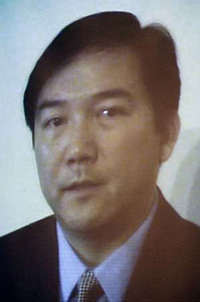 |
 |
 |
 Editorials | Issues | July 2007 Editorials | Issues | July 2007  
$205 Million Alibi, or Drug Evidence?
 Dudley Althaus - Houston Chronicle Dudley Althaus - Houston Chronicle
go to original


| | A picture taken from a video projected on a screen shows Zhenli Ye Gon, during a press conference held by his lawyers in Washington, July 18, 2007. Mexico has asked the United States to extradite the suspected narcotics manufacturer who owns a Mexico City mansion, where police discovered $206 million in cash earlier this year, a government source said July 13. (Reuters/Jason Reed) |
Mexico City — Weird got a little weirder last week in the case surrounding the seizure four months ago of more than $205 million in alleged narcotics money from a businessman's mansion here.

Zhenli Ye Gon, whom officials accuse of hoarding the cash from selling chemicals used to make crystal methampetamine, called on President Felipe Calderon to "open his eyes wider" to what he said was the reality of the case.

He said most of the money came from a campaign in last year's elections, but backed off allegations that it was tied to Calderon.

"Let people see what is going on," Zhenli, 44, a naturalized Mexican of Chinese descent, said by telephone from an undisclosed location in the United States.

Mexican officials recently filed an "urgent" request for Zhenli's extradition, which is under consideration by a U.S. district court. The Mexicans say Zhenli has used the allegations to avoid prosecution in Mexico.

The March 15 cash seizure at Zhenli's home in one of Mexico City's tonier neighborhoods was hailed at the time as the largest in the nation's history and as proof of its resolve to pursue the war on drugs. The seizure came one day after Calderon and President Bush pledged at a summit meeting in Mexico to press the fight against drug traffickers.

In an interview with the Associated Press nearly three weeks ago, Zhenli accused Mexico's labor secretary, Javier Lozano, of forcing him upon pain of death to hide $150 million of the seized cash at his mansion. There has not yet been an explanation for the source of the remainder of the seized money.

Lozano, who played a senior role in Calderon's campaign, has denied the accusation.

A Mexico City newspaper on Monday published a long letter attributed to Zhenli repeating those allegations. But Zhenli suggested Wednesday that letter was not written by him and that he wasn't sure of the source of the $150 million — only that it wasn't his and wasn't from the illegal drug trade.

Martin McMahon, one of Zhenli's lawyers, suggested his client had been set up.

"The person who did this is a very devious political adviser," McMahon said at a news conference in Washington, carried live on the Web page of the Mexico City newspaper Reforma.

"There are people who know what happened here," he said. "I can't pull them out of a hat. We need help."

Allegations dismissed

Calderon has dismissed Zhenli's allegations. "They are not only false, they are ridiculous," he said. "It's nothing more than a really very clumsy and foolish strategy."

The case seems to have become more convoluted by the day, spawning newspaper headlines and opinion columns. It has acquired the feel of the scandals that routinely rattled Mexico's political and economic elite during the last years of the Institutional Revolutionary Party's rule. The party, known as the PRI, lost power in 2000.

A Shanghai-born businessman, Zhenli has lived in Mexico since 1990. He reportedly made a fortune in the clothing business before getting involved in the importation of ingredients for legal pharmaceuticals.

Those same ingredients are used in the manufacture of crystal methamphetamine, a drug popular in the United States.

Calderon has made the war on Mexico's drug-smuggling organizations the signature of his presidency since taking office in December following a narrow victory over a leftist challenger. He has sent army troops against the drug gangs.

dqalthaus@yahoo.com | 
 | |
 |



